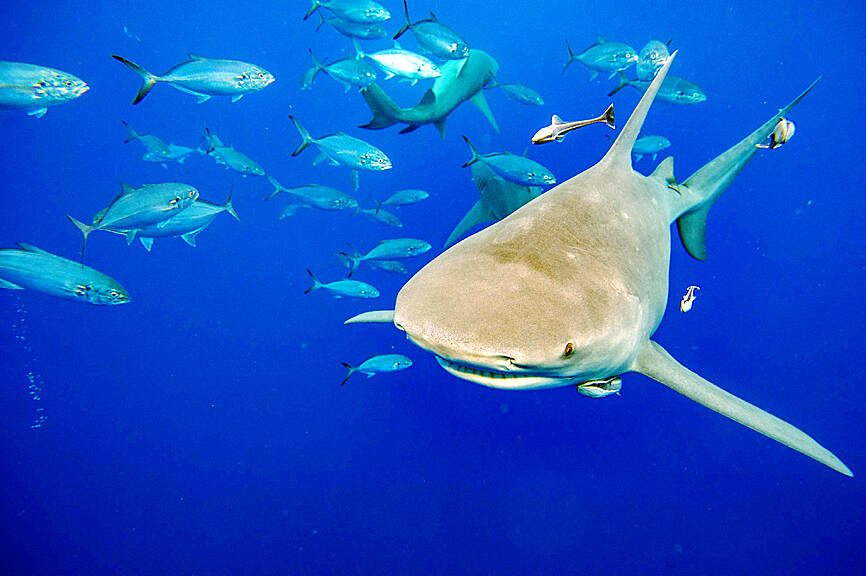An international wildlife conference moved to enact some of the most significant protection for shark species targeted in the fin trade and scores of turtles, lizards and frogs whose numbers are being decimated by the pet trade.
The Convention on International Trade in Endangered Species of Wild Fauna and Flora (CITES) ended on Friday in Panama. Along with protections for more than 500 species, delegates at the UN wildlife conference rejected a proposal to reopen the ivory trade. An ivory ban was enacted in 1989.
“Good news from CITES is good news for wildlife as this treaty is one of the pillars of international conservation, imperative at ensuring countries unite at combatting the global interrelated crises of biodiversity collapse, climate change and pandemics,” Wildlife Conservation Society vice president of international policy Susan Lieberman said.

Photo: AFP
“Many of the proposals adopted here reflect there is ongoing overexploitation and unsustainable trade and escalating illegal trade, and some are due to complex interactions of other threats reducing species populations in the wild, including climate change, disease, infrastructure development and habitat loss,” she added.
The international wildlife trade treaty, which was adopted 49 years ago in Washington, has been praised for helping stem the illegal and unsustainable trade in ivory and rhinoceros horns, as well as in whales and sea turtles.
However, it has come under fire for its limitations, including its reliance on cash-strapped developing countries to combat illegal trade that has become a lucrative US$10 billion-a-year business.

Photo: AFP
One of the biggest achievement this year was increasing or providing protection for more than 90 shark species, including 54 species of requiem sharks, the bonnethead shark, three species of hammerhead shark and 37 species of guitarfish. Many had never before had trade protection and now, under Appendix II, the commercial trade will be regulated.
Global shark populations are declining, with annual deaths due to fisheries reaching about 100 million. Sharks are sought mostly for their fins, which are used in shark fin soup, a popular delicacy in China and elsewhere in Asia.
“These species are threatened by the unsustainable and unregulated fisheries that supply the international trade in their meat and fins, which has driven extensive population declines,” Humane Society International senior director for wildlife Rebecca Regnery said in a statement. “With Appendix II listing, CITES Parties can allow trade only if it is not detrimental to the survival of the species in the wild, giving these species help they need to recover from over-exploitation.”
The conference also enacted protections for dozens of species of turtle, lizard and frogs, including glass frogs, whose translucent skin made them a favorite in the pet trade. Several species of song birds also got trade protection.
“Already under immense ecological pressure resulting from habitat loss, climate change and disease, the unmanaged and growing trade in glass frogs is exacerbating the already existing threats to the species,” International Fund for Animal Welfare US country director Danielle Kessler said in a statement. “This trade must be regulated and limited to sustainable levels to avoid compounding the multiple threats they already face.”
However, some of the more controversial proposals were not approved.
Some African countries and conservation groups had hoped to ban the trade in hippos, but it was opposed by the EU, some African countries and several conservation groups, which said that many countries have healthy hippo populations and that trade is not a factor in their decline.
“Globally cherished mammals such as rhinos, hippos, elephants and leopards didn’t receive increased protections at this meeting while a bunch of wonderful weirdos won conservation victories,” Center for Biological Diversity international legal director Tanya Sanerib said in a statement. “In the midst of a heart-wrenching extinction crisis, we need global agreement to fight for all species, even when it’s contentious.”

‘IN A DIFFERENT PLACE’: The envoy first visited Shanghai, where he attended a Chinese basketball playoff match, and is to meet top officials in Beijing tomorrow US Secretary of State Antony Blinken yesterday arrived in China on his second visit in a year as the US ramps up pressure on its rival over its support for Russia while also seeking to manage tensions with Beijing. The US diplomat tomorrow is to meet China’s top brass in Beijing, where he is also expected to plead for restraint as Taiwan inaugurates president-elect William Lai (賴清德), and to raise US concerns on Chinese trade practices. However, Blinken is also seeking to stabilize ties, with tensions between the world’s two largest economies easing since his previous visit in June last year. At the

UNSETTLING IMAGES: The scene took place in front of TV crews covering the Trump trial, with a CNN anchor calling it an ‘emotional and unbelievably disturbing moment’ A man who doused himself in an accelerant and set himself on fire outside the courthouse where former US president Donald Trump is on trial has died, police said yesterday. The New York City Police Department (NYPD) said the man was declared dead by staff at an area hospital. The man was in Collect Pond Park at about 1:30pm on Friday when he took out pamphlets espousing conspiracy theories, tossed them around, then doused himself in an accelerant and set himself on fire, officials and witnesses said. A large number of police officers were nearby when it happened. Some officers and bystanders rushed

Beijing is continuing to commit genocide and crimes against humanity against Uyghurs and other Muslim minorities in its western Xinjiang province, U.S. Secretary of State Antony Blinken said in a report published on Monday, ahead of his planned visit to China this week. The State Department’s annual human rights report, which documents abuses recorded all over the world during the previous calendar year, repeated language from previous years on the treatment of Muslims in Xinjiang, but the publication raises the issue ahead of delicate talks, including on the war in Ukraine and global trade, between the top U.S. diplomat and Chinese

RIVER TRAGEDY: Local fishers and residents helped rescue people after the vessel capsized, while motorbike taxis evacuated some of the injured At least 58 people going to a funeral died after their overloaded river boat capsized in the Central African Republic’s (CAR) capital, Bangui, the head of civil protection said on Saturday. “We were able to extract 58 lifeless bodies,” Thomas Djimasse told Radio Guira. “We don’t know the total number of people who are underwater. According to witnesses and videos on social media, the wooden boat was carrying more than 300 people — some standing and others perched on wooden structures — when it sank on the Mpoko River on Friday. The vessel was heading to the funeral of a village chief in